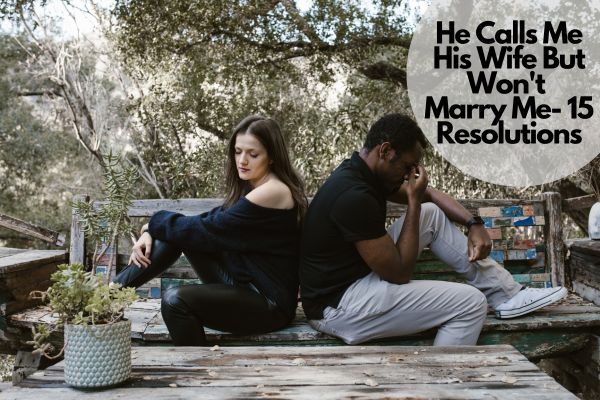“He calls me his wife but won’t marry me” is one of the many worries of women in relationships. This article helps to navigate the complexities of such unofficial commitment and also delves into the complexities and challenges faced by individuals who find themselves in relationships where their partners use the term “wife” or “husband” but shy away from the formal commitment of marriage.
In this thought-provoking content, we explore the reasons why some couples opt for an unofficial commitment and examine the emotional implications it can have on both partners. We delve into the different perspectives surrounding this unique phenomenon, ranging from fear of commitment and personal reservations to societal pressures and the desire for autonomy.
He Calls Me His Wife But Won’t Marry Me – 15 Resolutions
Dealing with a situation where someone refers to you as their wife but is unwilling to marry you can be challenging and emotionally difficult. It’s important to prioritize your own happiness and well-being. Here are 15 resolutions to consider when faced with such a challenge:
1. Communicate Openly
Have an honest conversation with your partner about your feelings and expectations regarding marriage. Express your desire for clarity and commitment in the relationship which will in turn make you see the big picture and give you a clear view of the goal of the relationship. Communicating with your partner about your earnest feelings not only gives you a sense of relief but also brings transparency to the relationship
2. Understand His Perspective
Try to understand your partner’s reasons for not wanting to marry. Listen attentively and empathetically to his concerns or reservations. Sometimes most women may not truly grasp or understand what is going through their partner’s minds or see things through their eyes. Understanding your partner’s perspective will make you realize his best intentions for you and why he acts the way he does in the relationship.
3. Reflect On Your Needs
Take time to reflect on your own needs and desires. Consider whether marriage is a fundamental aspect of your personal happiness and long-term goals. Knowing your needs and defining your clear goals in a relationship will give you a clear understanding of what you want in a relationship before entering it or what you can get from it during the relationship.
4. Seek Professional Help
Consider attending couples therapy or relationship counseling together. A professional can help facilitate communication and explore deeper issues lurking in your relationship. It is also a great way to bond with your partner and understand what his burdens and Joys are in the relationship. Seeking a professional is definitely a good way to steady the ship during troubled times and overcome whatever challenges that arise.
5. Set A Timeline
Like they say aim at nothing, you get nothing. Entering into a relationship with a clear goal on what it is important to you is not really a good mood. Always make your intentions known to your partner. If marriage is important to you, establish a reasonable timeline for when you expect a decision to be made. This will help you gauge your partner’s level of commitment.
6. Evaluate Your Compatibility
Assess whether you and your partner share core values, goals, and visions for the future. Marriage is a significant commitment, and it’s important to be on the same page. No marriage can work if both partners are not compatible enough to make it work. Understanding and evaluating your compatibility will give you a clear understanding on the way you see your partner and if he’s the right one for you.
7. Focus On The Relationship’s Strength
All relationships have both strengths and weaknesses that help make them thrive. A positive attitude will definitely bring a positive result. Identify the positive aspects of your relationship that bring you joy and fulfillment. Acknowledge the love and connection you share, regardless of the official title or whatever challenges you’re going through.
8. Prioritize Self-care
Take care of yourself emotionally, mentally, and physically. Engage in activities that bring you happiness and help you maintain a healthy sense of self-worth. This will in turn give you a positive mindset and attitude towards your partner. Practicing self-care in your relationship is a must. It puts you in the right attitude to tackle challenges because when all is said and done, you only have yourself to blame for whatever actions you take.
9. Discuss Legal Implications
In every relationship, always know your rights!! Have an open conversation about the legal implications of marriage and how it may impact your life, finances, and potential future plans. Talking with a lawyer and understanding the consequences of not getting married gives you a clear picture of what your right is and when to walk away from the relationship if things aren’t going the way you expect.
10. Explore Alternative Commitments
Consider exploring other ways to solidify your commitment without marriage, such as drafting a cohabitation agreement or creating a partnership commitment ceremony that aligns with your values and core beliefs. Having better alternatives gives you confidence in the relationship making sure you don’t get left out if things go bad
11. Seek Support From Loved Ones
Reach out to friends or family members who can provide you with emotional support and guidance during this challenging time. Their perspectives may offer valuable insights into your relationship. Most times, we are blinded by love and may not see things as clearly as need be. Reaching out to friends and families for advice can help boost the relationship during tough times.
12. Consider Compromises
Explore potential compromises that may bridge the gap between your desires and your partner’s reservations. Find a middle ground that meets both of your needs. The ability to compromise in your relationship is one of the key elements of a healthy relationship. A relationship is basically the coming together of 2 different people with different ideologies and backgrounds that are willing to compromise in order to make it work.
13. Reevaluate The Relationship
If your partner remains unwilling to marry and it’s a non-negotiable for you, it may be necessary to reassess the future of the relationship. Ask yourself if you are willing to compromise your own desires for the long term. This will help prevent you from wasting your time, energy, and resources on an unfruitful relationship. Knowing when to leave and when to stay in a relationship is a necessary skill to have
14. Make Your Own Decisions
Ultimately, you have control over your own life and happiness. Trust your instincts and make decisions that align with your values and aspirations, regardless of external pressures. Being in a relationship where you don’t have a say is more like a prison or a situationship. Learn to speak out when uncomfortable so you don’t get taken for granted.
15. Keep An Open Mind
While marriage may be important to you, it’s important to keep an open mind and consider alternative forms of commitment and fulfillment. Explore different perspectives and possibilities for happiness in your relationship. The relationship is more fun when both partners are willing to try something different or explore beyond their comfort zone.
Remember, these resolutions are suggestions, and it’s important to tailor them to your unique situation. Trust yourself and prioritize your own well-being throughout this process.
Emotional Implications Of Unofficial Relationships
Unofficial relationships, sometimes referred to as “casual” or “undefined” relationships, can carry various emotional implications for those involved. While each person’s experience may differ, there are some common emotional aspects that often arise in such relationships. Here are a few key points to consider:
1. Uncertainty And Ambiguity
Unofficial relationships typically lack clear definitions or commitments, leaving individuals uncertain about their partner’s intentions and the future of the relationship. This ambiguity can lead to feelings of insecurity and anxiety, as one may constantly wonder about the level of emotional investment or the potential for the relationship to progress.
Due to the absence of a formal commitment, individuals in unofficial relationships may fear expressing their true emotions or desires, fearing that it could lead to rejection or the end of the relationship. This fear can create emotional barriers and prevent individuals from fully opening up or developing a deeper connection.
2. Emotional Vulnerability
Despite the lack of formal commitment, people in unofficial relationships may still experience emotional vulnerability. They may find themselves developing feelings for their partner and becoming emotionally invested in the relationship. This vulnerability can be both exciting and challenging, as it involves navigating emotions without the reassurance of a clear commitment.
3. Communication Challenges
Unofficial relationships often lack open and honest communication about expectations, boundaries, and long-term goals. This can make it difficult for individuals to express their emotional needs or address any concerns they may have. Miscommunication or unmet expectations can lead to emotional frustration or disappointment.
On the positive side, unofficial relationships can offer a sense of freedom and flexibility. They allow individuals to explore romantic connections without the pressure of formal commitments or societal expectations. This can lead to a sense of enjoyment, adventure, and self-discovery.
4. Risk Of Emotional Imbalance
One person in an unofficial relationship may desire a more committed and emotionally intimate connection, while the other may prefer to keep things casual. This mismatch in emotional investment can lead to feelings of imbalance, with one person feeling emotionally unsatisfied or neglected.
This can result in hurt feelings, resentment, or a decision to end the relationship. The emotional implications can vary widely based on the individuals involved and their personal preferences. Some people may prefer the freedom and flexibility of an unofficial relationship, while others may seek a deeper emotional connection and long-term commitment.
Open and honest communication, along with understanding one’s own emotional needs, can be essential in navigating the emotional complexities of an unofficial relationship.
The Different Perspectives Surrounding Unofficial Relationships
Unofficial relationships, also known as casual relationships or situationships, can be viewed from various perspectives depending on individual experiences and values. Here are a few different viewpoints surrounding unofficial relationships:
1. Freedom And Independence
Some individuals embrace unofficial relationships as a way to maintain personal freedom and independence. They appreciate the lack of formal commitments and enjoy the ability to explore different connections without feeling tied down. From this perspective, unofficial relationships can be seen as liberating and empowering.
For some people, unofficial relationships serve as a means to avoid the expectations and responsibilities that come with formal commitments. They may have had negative experiences in past relationships or simply prefer to keep their options open. Unofficial relationships allow them to enjoy companionship and intimacy without the pressure to commit.
2. Exploration And Discovery
Unofficial relationships can be viewed as a period of exploration and self-discovery. Individuals in this mindset may see these relationships as opportunities to learn about themselves, their preferences, and their boundaries. They may engage in casual relationships to gain insights into what they truly want from a long-term partnership.
Unofficial relationships can be appealing to those who have experienced emotional pain or are hesitant to fully invest in a committed relationship. These individuals may prefer to keep things casual as a way to protect themselves from potential heartbreak or disappointment. Unofficial relationships allow them to keep a certain level of emotional distance and self-preservation.
3. Lack Of Clarity And Uncertainty:
Critics of unofficial relationships often highlight the lack of clarity and uncertainty that can accompany them. They argue that the absence of clear boundaries and commitment can lead to confusion, emotional turmoil, and unmet expectations.
From this perspective, unofficial relationships may be seen as unstable or lacking in substance. The disparity in Emotional Investment: Unofficial relationships can involve individuals with different levels of emotional investment. One person may desire a more committed connection while the other prefers to keep things casual.
This difference in emotional investment can lead to emotional imbalances, dissatisfaction, or conflicts. Some individuals view this aspect negatively, emphasizing the potential for hurt feelings or unmet needs.
4. Transitory Phase
Unofficial relationships can be seen as a transitional phase between being single and being in a committed partnership. Some individuals may view them as an opportunity to gradually build trust and emotional intimacy before making a formal commitment.
From this perspective, unofficial relationships can serve as a stepping stone toward a more serious relationship. Recognize that people’s perspectives on unofficial relationships can vary greatly, influenced by their past experiences, personal values, and desires.
What one person finds fulfilling or acceptable may not align with another person’s perspective. Open communication and understanding between the individuals involved are crucial for navigating and respecting differing viewpoints in unofficial relationships.
Conclusion
Navigating a situation where someone refers to you as their wife but is unwilling to marry you can be emotionally challenging. It’s important to have open and honest communication with your partner to better understand their perspective and motivations.
While there can be various reasons for their hesitation, such as personal fears, different definitions of marriage, or external factors, it’s crucial to evaluate your own needs and desires. Consider whether being referred to as a wife without a legal or formal commitment aligns with your personal values and goals.
Seeking professional help, such as relationship counseling, can also provide guidance and support in working through these challenges. Ultimately, finding a resolution that satisfies both partners requires understanding, patience, and a willingness to explore alternative options.








